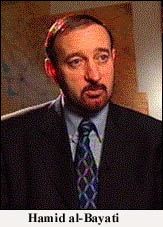 |
| Vol. 5 No. 5 | Table of Contents MEIB Main Page | May 2003 |
| | Interview: Dr. Hamid al-Bayati UK representative of the Supreme Council for the Islamic Revolution in Iraq (SCIRI) |
 |
Dr. Hamid al-Bayati was interviewed by Mahan Abedin at the SCIRI office in West Kensington, London on May 7, 2003.
Mahan Abedin is an analyst of Iranian politics, educated at the London School of Economics and Political Science.
| "We have agreed with other opposition groups that we are going to have a government that will represent everybody. A coalition government which will include the Shias, Sunnis, Kurds, Turkomans, and Christians. You can't have a government based on a religious Shia principle when you have other ethnic and religious groups." |
Notes
[1] Al-Hayat (London), 5 May 2003.